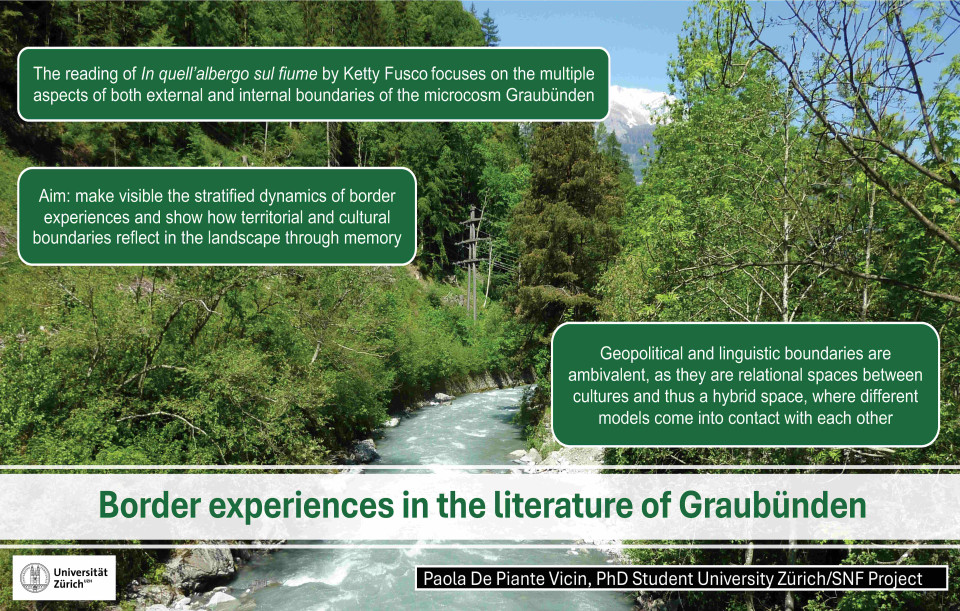The presentation offers an interpretation of the text In quell’albergo sul fiume by the Italian/Swiss author of Grisons origin, Ketty Fusco. By picturing the events of a destiny profoundly marked by the ideological categorization of the fascist period and its systems of persecution, the text focuses on the multiple aspects of both external and internal boundaries faced by the protagonist and relates them to the construction of individual identity. Significant factors include history and its territorial context, which, by permeating literature, make visible the stratified dynamics of geopolitical border experiences: in an era when the mechanisms of fascist power dominated Italian territory, the Grisons border between Italy and Switzerland represents the division between two existential conditions, between oppression and freedom, and with its crossing becomes a symbol of the transition from persecution to liberation. However, the geopolitical boundary is ambivalent, as it is a relational space between cultures and thus a hybrid space, where different models come into contact with each other, not necessarily a clear cut ideological boundary – as evidenced, for instance, by fascist infiltrations in Switzerland.
The text makes visible both the identity models that populated the Grisons region at the time and those that were reformulated based on the cultural differences coexisting in the area. It highlights the intersection of identity in relation to the linguistic-cultural boundaries dictated by the protagonist's family's bilingualism, with her Grisons mother speaking Swiss German and her father from Naples speaking Italian. The territorial and cultural boundaries also materialize in the landscape through memory: the places where the story unfolds can indeed be defined as 'spaces of memory,' quoting Aleida Assmann, that is, physical and symbolic spaces that have shaped memory and through which memory is now transmitted, and which become constituents of the sense of belonging and thus of the individual identity sphere.
In quell’albergo sul fiume is, according to Philippe Lejeune's theories, an autobiographical fiction, that is, an autobiographical retrospection in which there is a non-correspondence between the character's name and the author's name. It is a narrative strategy through which an interchange is created between personal events and elements of fiction that, on one hand, allows the writer to calibrate the expressive force of the events according to her intention, and on the other hand, grants the reader the freedom to find affinities or discrepancies between life and literature, thus interpreting the fictional story and reading it in the register they consider most appropriate. The discourse also extracts itself from historical-individual contingencies and projects into a more general dimension that testifies to historical events and sentiment, and the dimension of memory allows interpreting the events with greater awareness, projecting the past into a renewed construction of identity. Considering this latter aspect and referring to studies on cultural boundaries, the reading allows reflection on the relationship between boundary demarcation processes and identity from a multifaceted and diversified perspective, in which identity can be described as a continuous self-definition process, always provisional, open, and contradictory, shaped through social interactions.

